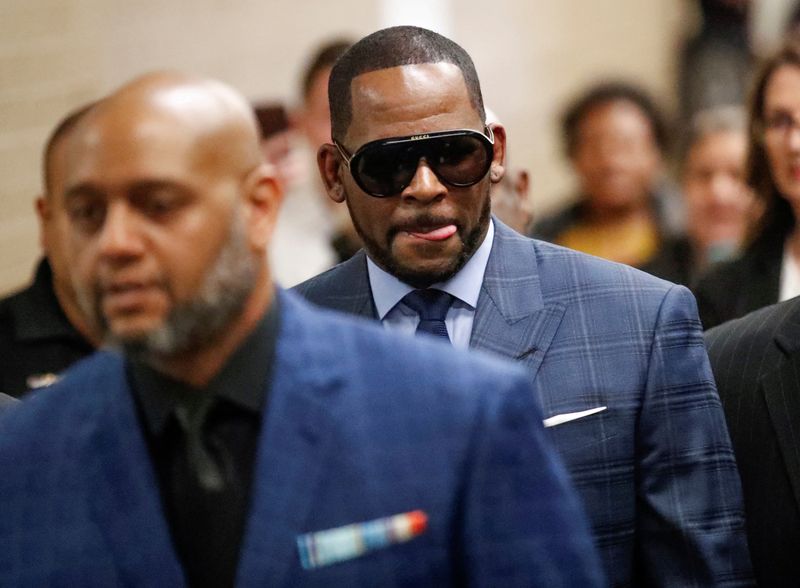R. Kelly challenge to sex abuse conviction draws skepticism from US appeals court

FILE PHOTO: Grammy-winning R&B singer R. Kelly arrives for a child support hearing at a Cook County courthouse in Chicago, Illinois, U.S. March 6, 2019. REUTERS/Kamil Krzaczynski/File Photo
By Jonathan Stempel
NEW YORK (Reuters) – A lawyer for R. Kelly struggled on Monday to convince a U.S. appeals court to overturn the former R&B superstar’s sex trafficking conviction and 30-year prison sentence.
Kelly, 57, is appealing his September 2021 conviction by a Brooklyn, New York, jury on all nine charges he faced, including racketeering and eight counts of violating the Mann Act, which forbids transporting people across state lines for prostitution.
His lawyer Jennifer Bonjean told the 2nd U.S. Circuit Court of Appeals that federal prosecutors failed to prove that the singer led a racketeering scheme where he recruited underage girls for sex and then violated several victims.
Questions from the three-judge panel in Manhattan suggested that argument might be a tough sell.
“Didn’t the government prove that one of the purposes of this enterprise was to recruit girls so that Kelly could have illegal sexual activity?” Circuit Judge Denny Chin asked.
Bonjean said it did not do so by relying on evidence such as Kelly’s employees passing out the phone number backstage of the singer, perhaps best known for the 1996 Grammy-winning smash “I Believe I Can Fly.”
“There was no evidence that anyone went out there saying, ‘May I find out what your age is, are you underage, come back, we want to serve you up to Mr. Kelly.'”
Circuit Judge Richard Sullivan suggested that the ages of some accusers might have been have been obvious.
“The appearance of these girls would be evidence enough, wouldn’t it?” he asked Bonjean.
“Looking young does not mean you know someone is a minor,” Bonjean responded.
‘NO WAY OUT’
The panel’s questioning of federal prosecutor Kayla Bensing was less pointed, as she spent three uninterrupted minutes recounting testimony from some accusers.
Some of the government’s 45 witnesses also testified that Kelly and his associates imposed repressive conditions, such as requiring that victims call him “Daddy” and get permission to eat or use the bathroom.
“The jury was entitled to infer that Kelly and his inner circle knew what was going on,” Bensing said. “He used the enterprise to make them feel like they were confined, and that they had no way out.”
Kelly, whose full name is Robert Sylvester Kelly, is among the most prominent people convicted of sexual misconduct during the #MeToo movement.
His conviction and sentencing followed two decades of misconduct accusations, which he has repeatedly denied.
Other arguments in Kelly’s appeal included that jurors prejudged his guilt, his lawyer was ineffective and the jury was improperly “swamped” by evidence of other alleged bad acts.
Kelly was also convicted in September 2022 by a Chicago jury of child sex crimes and sentenced to 20 years in prison.
But the judge there added just one year to Kelly’s imprisonment, with the other 19 years overlapping the original 30-year sentence.
Kelly has been behind bars July 2019, now at the Butner, North Carolina prison that housed late Ponzi schemer Bernard Madoff. He will be 78 when eligible for release in 2045.
(This story has been refiled to correct a typographical error where Kelly’s lawyer addressed ‘the’ appeals court instead of ‘he’ appeals court in paragraph 3)








